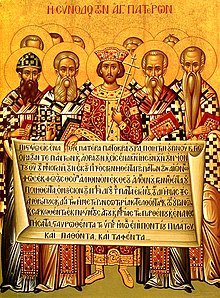User:Voss101/sandbox
The examples and perspective in this article may not represent a worldwide view of the subject. (February 2016) |

Orthodoxy (from
Related concepts
Orthodoxy is opposed to
The concept of orthodoxy is prevalent in many forms of organized monotheism. However, orthodox belief is not usually overly emphasized in polytheistic or animist religions, in which there is often little or no concept of dogma, and varied interpretations of doctrine and theology are tolerated and sometimes even encouraged within certain contexts. Syncretism, for example, plays a much wider role in non-monotheistic (and particularly, non-scriptural) religion. The prevailing governing norm within polytheism is often orthopraxy ("right practice") rather than the "right belief" of orthodoxy.
History of Orthodoxy
The earliest (first) recorded use of the term "orthodox" is in the
Following the 1054
Christianity
In classical Christian usage, the term orthodox refers to the set of doctrines which were believed by the
Following the 1054
Timeline of Christianity
The timeline begins at 1 AD with the
Non-religious contexts
Outside the context of religion, the term "orthodoxy" is often used to refer to any commonly held belief or set of beliefs in some field, in particular when these tenets, possibly referred to as "dogmas", are being challenged. In this sense, the term has a mildly pejorative connotation.
See also
- Belief in Jesus
- Chalcedonian Christianity
- Nicene Christianity
- First Council of Nicaea
- Council of Chalcedon
- Niceno-Constantinopolitan Creed (AD 325, 381)
- Four Marks of the Church
- Orthodox Judaism
- Orthodox Islam
- Paleo-orthodoxy
- Proto-orthodox Christianity
- Neo-orthodoxy
- Rule of Faith
- Theology
References
- ^ Harper, Douglas. "orthodoxy". Online Etymology Dictionary. Retrieved 2016-01-27.
- ^ orthodox. Dictionary.com. The American Heritage Dictionary of the English Language, Fourth Edition. Houghton Mifflin Company, 2004. Dictionary definition (accessed: March 03, 2008).
- ISBN 1-4931-0810-7.
- ^ Liddell & Scott; Code of Justinian: "We direct that all Catholic churches, throughout the entire world, shall be placed under the control of the orthodox bishops who have embraced the Nicene Creed."
- ^ Jostein Ådna (editor), The Formation of the Early Church (Mohr Siebeck 2005 ISBN 978-316148561-9), p. 342
Category:Christian belief and doctrine Category:Religious belief and doctrine Category:Christian terminology

